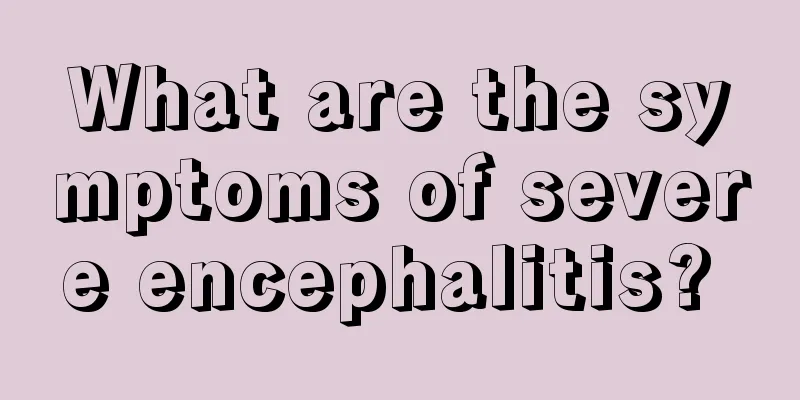What are the symptoms of severe encephalitis?

|
The brain is the command center of the human body and also the radiating center of human emotions and thoughts. It can be said that the brain controls the actions of the entire body. Therefore, the brain is an indispensable part of human beings. But the brain is also an organ tissue, which means it is as fragile as other organs and is prone to disease. For example, middle-aged and elderly people may suffer from cerebral infarction, young people may suffer from encephalitis and other diseases. Among them, encephalitis is the disease with the greatest impact. Patients often experience confusion and coma in the most serious stage. Let’s take a look at the symptoms of severe encephalitis. Encephalitis refers to an inflammatory lesion caused by the invasion of brain parenchyma by pathogens. Depending on the scope of the cause, it can be divided into broad and narrow sense. In a narrow sense, it refers to the inflammatory changes caused by direct invasion of the brain parenchyma by pathogenic microorganisms. Usually a narrow concept is used. The vast majority of causes are viruses, but they can also be caused by infections such as bacteria, fungi, spirochetes, rickettsia, parasites, etc. Some may be allergic diseases, such as acute disseminated encephalomyelitis. 1. Acute purulent meningitis The onset is acute, with severe pain in the whole head in the early stage, which is persistent and gradually worsens. Sometimes, there is an explosive headache on the basis of the persistent headache. This headache often radiates to the shoulders, neck, and back. The headache can be aggravated by any activity or coughing. 2. Tuberculous meningitis The onset is usually slow and is more common in children and young people. Before the onset, there are often symptoms of tuberculosis poisoning that last for 2 to 3 weeks, which may manifest as low fever, night sweats, loss of appetite, weight loss, and poor sleep. The onset of the disease is mainly characterized by a general headache, and the severity of the headache varies greatly. Some headaches are severe, accompanied by nausea and vomiting, while others are dull pain or distending pain that lasts for a long time. Children often have convulsions, accompanied by mental depression, apathy, delirium, and in severe cases, coma and incontinence. The early signs are not obvious, but in the late stage, typical signs of meningeal irritation and neurological localization appear, such as abducens nerve and oculomotor nerve paralysis, monoplegia or hemiplegia. 3. Viral meningitis The clinical manifestations are acute or subacute onset. The clinical symptoms of viral meningitis of various causes are very similar, with severe headache, persistent throbbing pain in the entire head, accompanied by fever, stiff neck, nausea, vomiting, fatigue, dizziness, and neck and back pain. The older the age, the more severe the symptoms. Physical examination rarely reveals positive findings, with meningeal irritation being the only neurological sign. |
<<: Is it the best medicine to treat tongue ulcers?
>>: What should I do if my face becomes red and itchy due to allergies?
Recommend
What are the best Chinese medicines for tonifying the spleen?
In fact, choosing some Chinese medicine to streng...
How to care for lung cancer patients after surgery? 6 correct care methods for lung cancer patients
For many lung cancer patients, after surgical tre...
What are the symptoms of non-atrophic gastritis?
Non-atrophic gastritis seriously affects the heal...
How to remove oil stains from clothes
A perfect image will always give others a better ...
Is blood sugar level 64 normal?
If a person's blood sugar reaches 64, it is s...
How much salt should be added to the salt water?
Water is the foundation of human survival. Drinki...
Complete List of Ear Diseases
Everyone should pay attention to the health of th...
Different water temperatures produce different washing effects
Taking a bath is essential for each of us. Differ...
How to treat mild gallstones
Most patients with gallstones do not need to try ...
What are the causes of arachnoid cysts?
Arachnoid cyst is generally a disease lesion form...
Pancreatic cancer recurred two months after surgery
When it comes to pancreatic cancer, many people a...
How to remove calf muscles?
Thick legs are a big problem that bothers many wo...
Is it necessary to do non-invasive surgery for twins
Pregnant women have to bear a certain risk factor...
Six-channel Syndrome Differentiation in Traditional Chinese Medicine
Six-Channel Syndrome Differentiation is a classic...
How to improve mild pulmonary hypertension
When pulmonary hypertension occurs, you must pay ...









